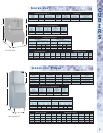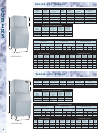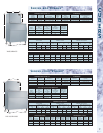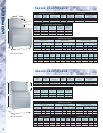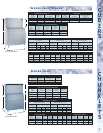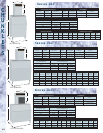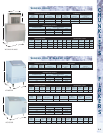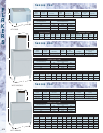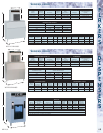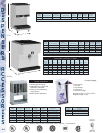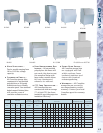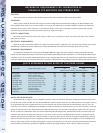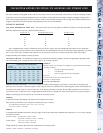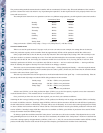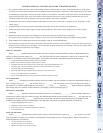
S
P
E
C
I
F
I
C
A
T
I
O
N
G
U
I
D
E
16
LOCATION
Always locate the ice machine where ambient temperatures will not fall below 50˚F nor rise above 100˚F.
CLEARANCE
Always make certain the machine and storage bin will fit through all doors and hallways leading to the final installation site.
When installed, there must be a 6-inch air clearance on rear, top and right side of Cornelius modular icemakers. Air intake and
discharge areas require a 6-inch clearance on all machines. Keep in mind when selecting the icemaker location that modular
machines may be stacked to increase production capacity as requirements grow.
UTILITY CONNECTIONS
Electrical, water and drain connections must be within 6 feet of machine location. All connections must meet national,
state and local codes.
ELECTRICAL REQUIREMENTS
Separate circuits, fuses and/or breakers are required for each icemaker or dispenser. Wire, fuse and circuit breaker sizes must be
calculated by a qualified electrician, based on the model’s specifications and must meet all national, state and local codes.
PLUMBING REQUIREMENTS
Ice machines must always be connected to the building’s cold water supply. For proper operation, water temperatures must not
exceed 45˚F-90˚F and pressure must be within 20-120 psi. Icemaker drain tubing must be a minimum of 1/2" I.D. Bin drain tubing must be
a minimum of 3/4" I.D. Icemaker and bin drains must be vented. Separate drain lines must be used for the icemaker and bin. Water-cooled
condenser drains must not be vented nor connected to icemaker or bin drain lines. All plumbing must meet national, state and local codes.
QUICK SIZING GUIDELINES
To determine the ice usage in a bar or restaurant, count the number of chairs for customers, multiply that number by 3 lbs. of ice
per bar stool and 1.5 lbs. per table seat. This should fulfill the customer’s needs, unless they are offering self-serve beverages or there is
an exceptionally large carry-out business. If the carry-out customer is at least one-third of the in-store business, add 1 lb. of ice for
each carry-out customer. Nursing home and hospital ice needs are calculated in much the same way. It is only necessary to count the
number of beds and refer to the following amounts: Hospitals need 10 lbs. of ice per bed; nursing homes require 6 lbs. of ice per bed.
Be sure to take into consideration other uses such as cafeterias and staff dining rooms, provided these areas do not have their own
icemakers. For churches or other places that use ice only once or twice a week, a small production machine on a large bin may be
adequate and economical to fulfill an occasional need for ice. However, if this is done and two meetings are scheduled one after the
other, the machine may not have time to adequately refill the bin before the start of the second engagement. When calculating total
daily ice usage make certain to include all anticipated ice usage. The final step is to consult the Cornelius specification sheets for the
model selected to determine its production capabilities under the operating conditions at the customer’s place of business.
MECHANICAL REQUIREMENTS FOR INSTALLATION OF
CORNELIUS ICE MACHINES AND STORAGE BINS
Customers
Application Sizing Guide (daily ice use) 100 250 500 1,000 1,500
(figures below include a 20% safety factor)
Restaurant 1.5 lbs. ice per meal sold 180 450 900 1,800 2,700
Cocktail Bar 3.0 lbs. ice per seat 360 900 1,800 3,600 5,400
Water Glass 6 oz. ice per 12 oz. glass 45 113 225 450 675
Salad Bar 35 lbs. of ice per cubic foot — — — — —
Beverage Only 5 oz. ice per 7-10 oz. cup 38 94 188 375 563
Beverage Only 8 oz. ice per 12-16 oz. cup 60 150 300 600 900
Beverage Only 12 oz. ice per 18-24 oz. cup 90 225 450 900 1,350
Guest Ice 5 lbs. per hotel room 600 1,500 3,000 6,000 9,000
Hotel Catering 1 lb. per person 120 300 600 1,200 1,800
Patient Ice 10 lbs. per patient 1,200 3,000 6,000 12,000 18,000
Cafeteria 1 lb. per person served 120 300 600 1,200 1,800
QUICK REFERENCE SIZING GUIDE BY CUSTOMER VOLUME



